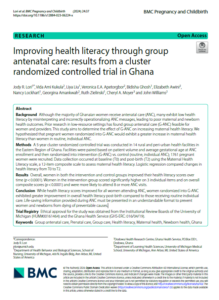
Abstract
Background: Although the majority of Ghanaian women receive antenatal care (ANC), many exhibit low health literacy by misinterpreting and incorrectly operationalizing ANC messages, leading to poor maternal and newborn health outcomes. Prior research in low-resource settings has found group antenatal care (G-ANC) feasible for women and providers. This study aims to determine the effect of G-ANC on increasing maternal health literacy. We hypothesized that pregnant women randomized into G-ANC would exhibit a greater increase in maternal health literacy than women in routine, individual ANC.
Methods: A 5-year cluster randomized controlled trial was conducted in 14 rural and peri-urban health facilities in the Eastern Region of Ghana. Facilities were paired based on patient volume and average gestational age at ANC enrollment and then randomized into intervention (G-ANC) vs. control (routine, individual ANC); 1761 pregnant women were recruited. Data collection occurred at baseline (T0) and post-birth (T2) using the Maternal Health Literacy scale, a 12-item composite scale to assess maternal health literacy. Logistic regression compared changes in health literacy from T0 to T2.
Results: Overall, women in both the intervention and control groups improved their health literacy scores over time (p < 0.0001). Women in the intervention group scored significantly higher on 3 individual items and on overall composite scores (p < 0.0001) and were more likely to attend 8 or more ANC visits.
Conclusion: While health literacy scores improved for all women attending ANC, women randomized into G-ANC exhibited greater improvement in overall health literacy post-birth compared to those receiving routine individual care. Life-saving information provided during ANC must be presented in an understandable format to prevent women and newborns from dying of preventable causes.